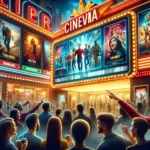The world of cinema is filled with beloved films that have their roots in literature. Book-to-film adaptations often spark heated debates among fans about whether the movie did justice to the source material. While some adaptations faithfully capture the magic of the novel, others stray too far, leaving audiences divided. In this article, we explore the fan community’s thoughts on the most notable book-to-film adaptations, discussing what works and what doesn’t when it comes to translating pages into cinematic masterpieces.
The Art of Adaptation: Balancing Loyalty and Creativity
Adapting a book for the big screen is no easy feat. Filmmakers must strike a balance between staying true to the source material and making necessary changes to fit the cinematic format. Some of the most successful adaptations have managed to stay faithful to the original story while enhancing it with visual storytelling.
- “The Lord of the Rings” trilogy by Peter Jackson is often hailed as one of the best examples of a faithful adaptation. While some minor details were omitted, the films captured the epic scope and emotional depth of J.R.R. Tolkien’s work, leaving both fans and critics satisfied.
- On the other hand, adaptations like “Percy Jackson & The Olympians” received backlash from fans of the book series for straying too far from the source material, with significant plot changes that disappointed readers.
What Fans Love About Book-to-Film Adaptations
For many fans, seeing their favorite characters and scenes brought to life on screen is a dream come true. The visual medium allows for a new way of experiencing beloved stories, often adding layers to the narrative through performance, cinematography, and music.
- “Harry Potter” is a prime example of a franchise where the adaptation added to the magic of the books. Fans loved seeing iconic locations like Hogwarts and Diagon Alley brought to life, as well as the stellar performances of the cast, which elevated the story beyond the page.
- Adaptations like “The Hunger Games” were praised for their attention to detail, capturing the dystopian atmosphere and intensity of Suzanne Collins’ novels.
Where Adaptations Go Wrong
Not all adaptations succeed in winning over fans. Sometimes, the changes made to the source material can feel unnecessary or, worse, betray the essence of the book.
- One of the most frequently cited examples is “Eragon”, a film adaptation that left fans of the book deeply disappointed. The movie significantly deviated from the novel, cutting important characters and plotlines, resulting in a film that felt hollow and incomplete.
- “The Dark Tower” series faced similar criticism. Fans of Stephen King’s epic story felt that the film condensed too much of the material, losing the rich character development and intricate world-building that made the books so compelling.
Fan Reactions: Loyalty to the Book vs. Cinematic Creativity
One of the most engaging aspects of book-to-film adaptations is the ongoing debate among fans. Some argue that adaptations should be as close to the original as possible, while others believe filmmakers should have the creative freedom to make changes that better fit the medium.
- A common argument in favor of creative liberties is that certain elements of a book may not translate well to film. For example, inner monologues or complex world-building often need to be streamlined for a two-hour movie. Fans of “The Shining” directed by Stanley Kubrick defend the changes made from Stephen King’s novel, as Kubrick’s version brought a unique psychological depth to the story.
- However, fans who are deeply attached to the original text often push back against significant changes. This can be seen in the backlash against “The Golden Compass”, which altered major themes of the book, leading to disappointment from its fan base.
The Future of Book-to-Film Adaptations
As the entertainment industry continues to evolve, so does the way in which book-to-film adaptations are approached. With the rise of streaming services like Netflix and Amazon Prime, more room is being made for longer, episodic adaptations, which allow for more faithful representations of complex books.
- “The Witcher” series on Netflix is one example of how a longer format can give room for more nuanced storytelling, staying closer to the source material and allowing character development to unfold at a pace more similar to the books.
- Fans are also eagerly anticipating adaptations like “Dune”, which promises to be an ambitious project that could set a new standard for book-to-film adaptations by splitting the novel into multiple films to preserve its rich detail.
The conversation around book-to-film adaptations is one that will likely continue as long as Hollywood keeps turning to literature for inspiration. Fans remain divided on what makes an adaptation successful, but one thing is certain—whether a film is loved or hated, it often ignites passionate discussion within the community. As we look to the future, it’s clear that adaptations will continue to captivate audiences, for better or worse.


